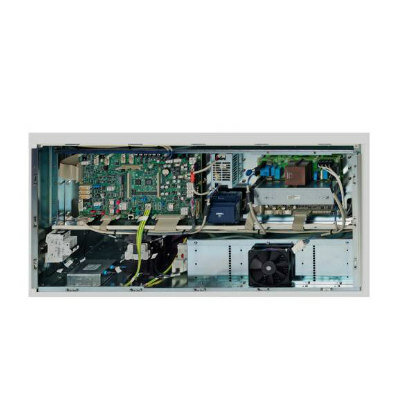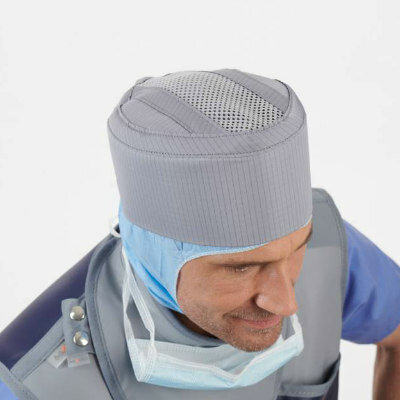Oncology Information System Supports Comprehensive Care
|
By MedImaging International staff writers Posted on 31 Jan 2018 |

Image: An innovative integrates oncology disciplines for improved patient care (Photo courtesy of RaySearch Laboratories).
A next-generation oncology information system (OIS) connects all oncology disciplines, enabling users to fluidly coordinate tasks and ensure optimal use of resources.
The RaySearch Laboratories (Stockholm, Sweden) RayCare OIS is intended to support comprehensive cancer treatment by enabling a truly integrated approach across oncology disciplines, including radiation therapy (RT), chemotherapy, and surgery. Automated active workflows are highly configurable, and tasks for specific staff members can be created automatically, triggered by defined events. By continually monitoring the status of the workflow, RayCare will know the moment a task is completed, actively selecting the next step in the process without any further user interaction.
RayCare also provides total control over treatment scheduling and use of resources, ensuring optimal allocation of treatment machines, accounting for treatment needs, clinical staff schedules, and other key parameters. New tools support time management during tumor board meetings and provide a single interface for notes and data gathering. The system also automatically documents the discussion and decisions made for each patient. Follow-up actions can then be set within the system.
RayCare is also designed to store all clinical data acquired during workup, planning, treatment delivery and follow-up in a structured and accessible format that is suitable for data analysis, enabling advanced automated follow-up of treatment outcomes for future research. In addition, RayCare was designed as a machine learning OIS with unique capabilities that can be used to coordinate oncology tasks, supporting comprehensive cancer care organized around each patient’s needs.
“RayCare is fundamentally different compared to other OIS systems, and we have invested a great deal of time and effort into creating something that will truly change the way that cancer is treated,” said Johan Löf, CEO of RaySearch Laboratories. “Our goal is to advance cancer treatment with high-performance tools that combine treatment planning, workflow and data management, resource optimization, machine learning, and follow-up in an effective way.”
RayCare integrates seamlessly with the RayStation treatment planning system, with proven algorithms allowing access to advanced features for clinical resource optimization, workflow automation, adaptive treatment, and clinical analytics.
The RaySearch Laboratories (Stockholm, Sweden) RayCare OIS is intended to support comprehensive cancer treatment by enabling a truly integrated approach across oncology disciplines, including radiation therapy (RT), chemotherapy, and surgery. Automated active workflows are highly configurable, and tasks for specific staff members can be created automatically, triggered by defined events. By continually monitoring the status of the workflow, RayCare will know the moment a task is completed, actively selecting the next step in the process without any further user interaction.
RayCare also provides total control over treatment scheduling and use of resources, ensuring optimal allocation of treatment machines, accounting for treatment needs, clinical staff schedules, and other key parameters. New tools support time management during tumor board meetings and provide a single interface for notes and data gathering. The system also automatically documents the discussion and decisions made for each patient. Follow-up actions can then be set within the system.
RayCare is also designed to store all clinical data acquired during workup, planning, treatment delivery and follow-up in a structured and accessible format that is suitable for data analysis, enabling advanced automated follow-up of treatment outcomes for future research. In addition, RayCare was designed as a machine learning OIS with unique capabilities that can be used to coordinate oncology tasks, supporting comprehensive cancer care organized around each patient’s needs.
“RayCare is fundamentally different compared to other OIS systems, and we have invested a great deal of time and effort into creating something that will truly change the way that cancer is treated,” said Johan Löf, CEO of RaySearch Laboratories. “Our goal is to advance cancer treatment with high-performance tools that combine treatment planning, workflow and data management, resource optimization, machine learning, and follow-up in an effective way.”
RayCare integrates seamlessly with the RayStation treatment planning system, with proven algorithms allowing access to advanced features for clinical resource optimization, workflow automation, adaptive treatment, and clinical analytics.
Latest Nuclear Medicine News
- New SPECT/CT Technique Could Change Imaging Practices and Increase Patient Access
- New Radiotheranostic System Detects and Treats Ovarian Cancer Noninvasively
- AI System Automatically and Reliably Detects Cardiac Amyloidosis Using Scintigraphy Imaging
- Early 30-Minute Dynamic FDG-PET Acquisition Could Halve Lung Scan Times
- New Method for Triggering and Imaging Seizures to Help Guide Epilepsy Surgery
- Radioguided Surgery Accurately Detects and Removes Metastatic Lymph Nodes in Prostate Cancer Patients
- New PET Tracer Detects Inflammatory Arthritis Before Symptoms Appear
- Novel PET Tracer Enhances Lesion Detection in Medullary Thyroid Cancer
- Targeted Therapy Delivers Radiation Directly To Cells in Hard-To-Treat Cancers
- New PET Tracer Noninvasively Identifies Cancer Gene Mutation for More Precise Diagnosis
- Algorithm Predicts Prostate Cancer Recurrence in Patients Treated by Radiation Therapy
- Novel PET Imaging Tracer Noninvasively Identifies Cancer Gene Mutation for More Precise Diagnosis
- Ultrafast Laser Technology to Improve Cancer Treatment
- Low-Dose Radiation Therapy Demonstrates Potential for Treatment of Heart Failure
- New PET Radiotracer Aids Early, Noninvasive Detection of Inflammatory Bowel Disease
- Combining Amino Acid PET and MRI Imaging to Help Treat Aggressive Brain Tumors
Channels
Radiography
view channel
Novel Breast Imaging System Proves As Effective As Mammography
Breast cancer remains the most frequently diagnosed cancer among women. It is projected that one in eight women will be diagnosed with breast cancer during her lifetime, and one in 42 women who turn 50... Read more
AI Assistance Improves Breast-Cancer Screening by Reducing False Positives
Radiologists typically detect one case of cancer for every 200 mammograms reviewed. However, these evaluations often result in false positives, leading to unnecessary patient recalls for additional testing,... Read moreMRI
view channel
PET/MRI Improves Diagnostic Accuracy for Prostate Cancer Patients
The Prostate Imaging Reporting and Data System (PI-RADS) is a five-point scale to assess potential prostate cancer in MR images. PI-RADS category 3 which offers an unclear suggestion of clinically significant... Read more
Next Generation MR-Guided Focused Ultrasound Ushers In Future of Incisionless Neurosurgery
Essential tremor, often called familial, idiopathic, or benign tremor, leads to uncontrollable shaking that significantly affects a person’s life. When traditional medications do not alleviate symptoms,... Read more
Two-Part MRI Scan Detects Prostate Cancer More Quickly without Compromising Diagnostic Quality
Prostate cancer ranks as the most prevalent cancer among men. Over the last decade, the introduction of MRI scans has significantly transformed the diagnosis process, marking the most substantial advancement... Read moreUltrasound
view channel
Deep Learning Advances Super-Resolution Ultrasound Imaging
Ultrasound localization microscopy (ULM) is an advanced imaging technique that offers high-resolution visualization of microvascular structures. It employs microbubbles, FDA-approved contrast agents, injected... Read more
Novel Ultrasound-Launched Targeted Nanoparticle Eliminates Biofilm and Bacterial Infection
Biofilms, formed by bacteria aggregating into dense communities for protection against harsh environmental conditions, are a significant contributor to various infectious diseases. Biofilms frequently... Read moreGeneral/Advanced Imaging
view channel
New AI Method Captures Uncertainty in Medical Images
In the field of biomedicine, segmentation is the process of annotating pixels from an important structure in medical images, such as organs or cells. Artificial Intelligence (AI) models are utilized to... Read more.jpg)
CT Coronary Angiography Reduces Need for Invasive Tests to Diagnose Coronary Artery Disease
Coronary artery disease (CAD), one of the leading causes of death worldwide, involves the narrowing of coronary arteries due to atherosclerosis, resulting in insufficient blood flow to the heart muscle.... Read more
Novel Blood Test Could Reduce Need for PET Imaging of Patients with Alzheimer’s
Alzheimer's disease (AD), a condition marked by cognitive decline and the presence of beta-amyloid (Aβ) plaques and neurofibrillary tangles in the brain, poses diagnostic challenges. Amyloid positron emission... Read more.jpg)
CT-Based Deep Learning Algorithm Accurately Differentiates Benign From Malignant Vertebral Fractures
The rise in the aging population is expected to result in a corresponding increase in the prevalence of vertebral fractures which can cause back pain or neurologic compromise, leading to impaired function... Read moreImaging IT
view channel
New Google Cloud Medical Imaging Suite Makes Imaging Healthcare Data More Accessible
Medical imaging is a critical tool used to diagnose patients, and there are billions of medical images scanned globally each year. Imaging data accounts for about 90% of all healthcare data1 and, until... Read more
Global AI in Medical Diagnostics Market to Be Driven by Demand for Image Recognition in Radiology
The global artificial intelligence (AI) in medical diagnostics market is expanding with early disease detection being one of its key applications and image recognition becoming a compelling consumer proposition... Read moreIndustry News
view channel
Bayer and Google Partner on New AI Product for Radiologists
Medical imaging data comprises around 90% of all healthcare data, and it is a highly complex and rich clinical data modality and serves as a vital tool for diagnosing patients. Each year, billions of medical... Read more





















